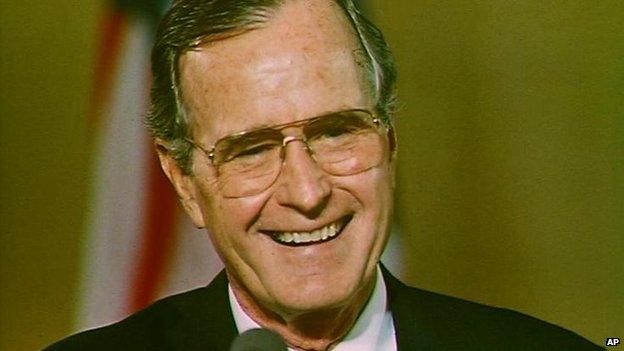Election 2015: Read my lips… no new taxes
- Published

History is littered with politicians promising - or appearing to promise - that they can re-write the rules of economics and then being forced to gag on their own words.
It's not that these leaders are fools - far from it.
Even as they uttered those words George Bush Senior and Gordon Brown must have been thinking "fingers crossed".
It is, and forgive me for insulting my readers here, that quite a lot of the people whose votes they're trying to secure are, if not fools, not well versed in economics.
So, it is that the hired hands who advise political parties now tell them that simply saying you want to do something or arguing that everyone knows that your party has those values doesn't cut it in an age of cynicism and short attention spans.
What we need, say the star strategists, is the equivalent of those price pledges which big stores use. You know the sort of thing - "never knowingly undersold… price match guarantee... etc".
That's how you end up with today's promise from the Tories that whatever the state of the economy or the health of the public finances a new law will ensure that the three biggest taxes - income tax, National insurance and VAT - won't go up.
'Convince people'
Labour has made similar, though more limited guarantees, and it has not given them the added backing of a promise of the law.
It has, in the past though, when Alistair Darling, as Chancellor, promised a Budget Responsibility Act in 2009. It's interesting now to read what George Osborne said then about that...
He said: "No other chancellor in the long history of the office has felt the need to pass a law in order to convince people that he has the political will to implement his own Budget.
"As one commentator observed this week, there are only two conclusions.
"Either the chancellor has lost confidence in himself to stick to his resolution, and is, so to speak, asking the police to help him, or he fears that everyone else has lost confidence in his ability to keep his word, but hopes that they might believe in the statute book if not in him. Neither is much of a recommendation for the chancellor of the day."
What's more, when William Hague made a similar pledge as party leader in 2000 he later abandoned it in order to reassure people that if the economy crashed he wouldn't cut health spending simply to deliver his tax promise.
These pledges, along with the repeated political cross-dressing we've seen are symptoms of a lack of trust in politicians and a weakening in the strength of the two main political brands.
They are also a symptom too, though, of voters not demanding that politicians are more honest about the limits of what they can promise and deliver given the unpredictability of the world.